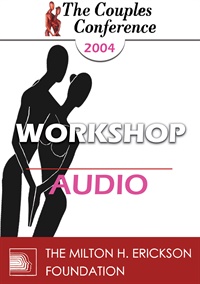
- Average Rating:
- Not yet rated
- Topic Areas:
- Workshops | Couples Therapy | Intimacy | Multicultural | Sex and Sexuality
- Categories:
- Couples Conference | Couples Conference 2004
- Faculty:
- Esther Perel, MA, LMFT
- Duration:
- 1:28:38
- Format:
- Audio Only
- Original Program Date:
- Mar 26, 2004
- Short Description:
- This workshop examines the cultural pressures that shape domesticated sex and the puzzling inverse correlation between greater emotional intimacy and the loss of sexual desire. It will demonstrate how to help couples draw pleasure from the hidden, the suggestive and the uncanny while also respecting their needs for safety and stability. Using case examples, we will explore how to grant the body its profound capacities for communicating in its own language.
- Price:
- $15.00 - Base Price
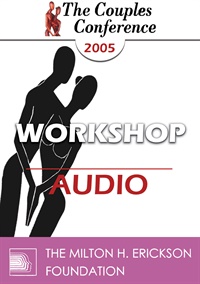
- Average Rating:
- Not yet rated
- Topic Areas:
- Workshops | Couples Therapy | Hypnosis | Sex and Sexuality | Ericksonian Hypnosis and Therapy Techniques
- Categories:
- Couples Conference | Couples Conference 2005
- Faculty:
- Jeffrey Zeig, PhD
- Duration:
- 1:47:54
- Format:
- Audio Only
- Original Program Date:
- Mar 06, 2005
- Short Description:
- Covered in this workshop will be an overview of issues in sex counseling; demographic information; issues in assessment; a phenomenological model; Ericksonian assumptions; and couples exercises for enhancing intimacy.
- Price:
- $15.00 - Base Price
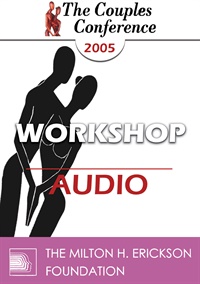
- Average Rating:
- Not yet rated
- Topic Areas:
- Workshops | Couples Therapy | Sex and Sexuality
- Categories:
- Couples Conference | Couples Conference 2005
- Faculty:
- Pat Love, EdD
- Duration:
- 2:31:15
- Format:
- Audio Only
- Original Program Date:
- Mar 06, 2005
- Short Description:
- This workshop will address the three most common sexual issues in therapy - desire discrepancy, low sexual desire and lack of sexual attraction. Physiological as well as psychological dimensions will be explored using current research and clinical applications.
- Price:
- $15.00 - Base Price
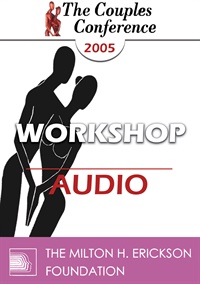
- Average Rating:
- Not yet rated
- Topic Areas:
- Workshops | Couples Therapy | Hypnosis | Sex and Sexuality | Ericksonian Hypnosis and Therapy Techniques
- Categories:
- Couples Conference | Couples Conference 2005
- Faculty:
- Jeffrey Zeig, PhD
- Duration:
- 2:38:21
- Format:
- Audio Only
- Original Program Date:
- Mar 06, 2005
- Short Description:
- Continuing from the morning program, covered in this workshop are principles for using hypnosis; advantages of hypnosis in sex counseling; experiential methods; induction approaches for hypnosis and sex therapy; and Erickson cases.
- Price:
- $15.00 - Base Price
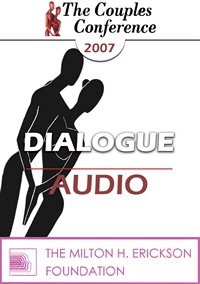
- Average Rating:
- Not yet rated
- Topic Areas:
- Dialogues | Couples Therapy | Sex and Sexuality
- Categories:
- Couples Conference | Couples Conference 2007
- Faculty:
- Pat Love, EdD | Jeffrey Zeig, PhD
- Duration:
- 59:33
- Format:
- Audio Only
- Original Program Date:
- Apr 28, 2007
- Short Description:
- CC07 Dialogue 02 - Integrating Sex Therapy into Couples Counseling - Pat Love, EdD, and Jeffrey Zeig, PhD
- Price:
- $15.00 - Base Price
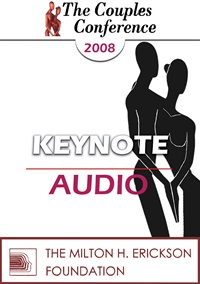
- Average Rating:
- Not yet rated
- Topic Areas:
- Keynotes | Couples Therapy | Love | Sex and Sexuality
- Categories:
- Couples Conference | Couples Conference 2008
- Faculty:
- Otto Kernberg, MD
- Duration:
- 56:57
- Format:
- Audio Only
- Original Program Date:
- Apr 26, 2008
- Short Description:
- This presentation will explore the expression of basic conflicts between love and aggression in a couple’s sexual life, their daily interactions, and their value systems. The analysis of chronic couples’ conflicts will be followed by the outline of an essentially psychoanalytic approach to their diagnostic assessment, and the characteristics of analytic and supportive strategies of treatment.
- Price:
- $15.00 - Base Price
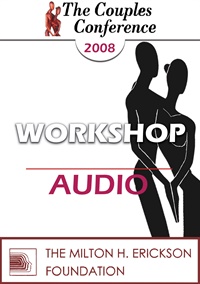
- Average Rating:
- Not yet rated
- Topic Areas:
- Workshops | Assessment | Couples Therapy | Conflict | Sex and Sexuality
- Categories:
- Couples Conference | Couples Conference 2008
- Faculty:
- Otto Kernberg, MD
- Duration:
- 2:27:19
- Format:
- Audio Only
- Original Program Date:
- Apr 25, 2008
- Short Description:
- This workshop will explore the assessment of the functioning of couples in their sexual life, their daily interactions, and their individual and jointly arrived at value systems. The techniques of this assessment, the combination of couples’ and individual partners’ interviews will be followed by an overview of alternative therapeutic strategies.
- Price:
- $15.00 - Base Price
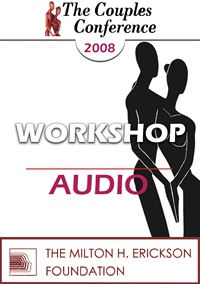
- Average Rating:
- Not yet rated
- Topic Areas:
- Workshops | Couples Therapy | Sex and Sexuality | Intimacy | LGBTQ
- Categories:
- Couples Conference | Couples Conference 2008
- Faculty:
- Esther Perel, MA, LMFT
- Duration:
- 2:00:39
- Format:
- Audio Only
- Original Program Date:
- Apr 26, 2008
- Short Description:
- The story of sex in committed modern couples is one that often tells of a dwindling desire that includes a long list of sexual alibis, claiming to explain the inescapable death of Eros. The absence of fantasy, the proliferation of pornography and affairs, as well as a lack of understanding of the nature of erotic desire all contribute to the predicament. This workshop examines the cultural pressures that shape domesticated sex and the puzzling inverse correlation between greater emotional intimacy and the loss of sexual desire.
- Price:
- $15.00 - Base Price
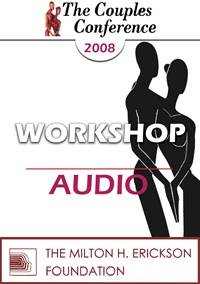
- Average Rating:
- Not yet rated
- Topic Areas:
- Workshops | Couples Therapy | Multicultural | Sex and Sexuality | Intimacy
- Categories:
- Couples Conference | Couples Conference 2008
- Faculty:
- Esther Perel, MA, LMFT
- Duration:
- 2:16:00
- Format:
- Audio Only
- Original Program Date:
- Apr 27, 2008
- Short Description:
- Couples’ expectations about the role of sexuality in intimate relationships have changed dramatically over the past 40 years. We will explore the main ideas of the romantic ideal: how we want our partner to fulfill our needs for connection, belonging and continuity, as well as give the sense of transcendence, mystery and passion. Examining the cultural values of love and respect, freedom and responsibility, and interdependence vs. autonomy, we will map a culturally relevant approach to work with the dilemmas of desire in couples. We also will probe the difference between clearly assigned gender role repartition and the post-feminist egalitarian model.
- Price:
- $15.00 - Base Price
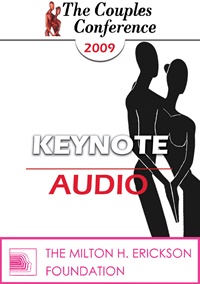
- Average Rating:
- Not yet rated
- Topic Areas:
- Keynotes | Couples Therapy | Sex and Sexuality | Intimacy
- Categories:
- Couples Conference | Couples Conference 2009
- Faculty:
- Esther Perel, MA, LMFT
- Duration:
- 53:02
- Format:
- Audio Only
- Original Program Date:
- May 02, 2009
- Short Description:
- CC09 Keynote 03 - Mating and Captivity: The Paradox of Sex and Intimacy - Esther Perel, MA, LMFT
- Price:
- $15.00 - Base Price
Please wait ...

